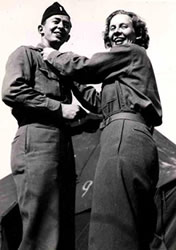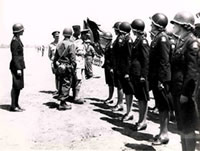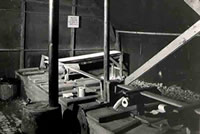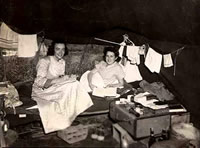1st Lieutenant Alice M. Huffman, Nurse
John L. Guerrant | Hubert B. Holsinger | Alice M. Huffman | Frank L. Lowther | Randal Luscombe | Dorothy Sandridge | Melvin C. Shaffer | William P. Snavely | Beverley D. Tucker | Frances E. Wells | 8th EVAC home

Alice Huffman Pinning New Bars on William Snavely
Alice Huffman was born in 1917 in Roanoke, Virginia. She graduated from Roanoke High School and the University of Virginia School of Nursing. She then became a nurse with the 8th Evacuation Hospital. After the war she and Helen Berkeley moved to Nashville, Tennessee, to work in the new Veteran’s Administration Hospital that had been Thayer General Hospital. She was assigned to a surgical ward, and Helen worked on a tuberculosis ward. As veterans, they were expected to further their education using the G. I. Bill. There were so many in the same situation that the University of Tennessee sent teachers out to them instead of them going to the teachers. As the years passed, she became head nurse on a surgical ward and later supervisor of the surgical wards and the recovery room.
In the early fifties Dr. Harry Joseph Bugel became the director of Physical Medicine and Rehabilitation at the V. A. Hospital. In 1960, several years after his first wife died, he and Miss Huffman were married in a small ceremony in the V. A. Chapel. She helped raise his two children and their daughter. After her husband’s stroke in 1993, which left him unable to walk, she became his principal care giver. He passed away after 45 years of marriage. Mrs. Bugel was a long time member of the Vanderbilt Sewing Club which sews for the Vanderbilt hospital, worked weekly in her church library, and was active in the D.A.R. She considered herself very lucky. She died peacefully in her sleep in December 2012 at the age of 95.
I am writing to describe what it was like to be with the 8th Evacuation Hospital during World War II. On March 4, 1943, I received my orders to go on a troop convoy ship across the Atlantic Ocean. The ship was completely blacked out and had to travel in a zig-zag pattern at all times. We were always in danger of being attacked by submarines, and once we were left behind by the convoy. After our time in nothern Africa, we again boarded a ship, this time to cross the Mediterranean to Italy. When we got to Italy, we went over the side of the boat on ropes, got into an amphibious craft, and landed on the beach at Salerno. The day we landed was the first day the beach had not been strafed by gunfire.
8th Evac Nurses Presented to King George VI
A German submarine had sunk the ship carrying our equipment so we slept in pup tents for a week or more while waiting to be re-equipped. One day a friend and I decided to climb a small hill that had a church at the top. While we were resting, we found that one outfit was storing some of their belongings in the church. When they finished unloading, a general came out and asked if we would like a lift down the hill. We accepted his offer, and he introduced himself as General Sullivan, head of the quartermaster corps of the Fifth Army. He asked what outfit we were in, and we told him our story and that we were sleeping in pup tents. He asked what we needed most, and we told him we needed tents for the nurses. He sent them over that afternoon. He became a good friend and danced with me when we happened to be at the same party. He waltzed beautifully.
That reminds me of another story. While we were being re-equipped, we camped near a hospital that was in operation. One day a huge storm tore down the entire hospital. Our commander was evacuating all the nurses, but we asked permission to stay and keep our possessions dry. We had a number of people helping us, and we did keep our tent from blowing down. The next morning we heard about the destruction of the hospital and the relocation of the patients to a tobacco warehouse. Those of us who had dry clothes were the first ones to be sent to help. We had very little to work with. I think we had a few thermometers. We made rounds with the doctors and asked each patient why he was in hospital. We had many cases with malaria. The patients would tell us how many days they had been on Atabrine, and we would tell them how many more days they were to take it. We were soon able to make better records. I don’t remember how long we took care of the patients, but it was a different experience.
Being night supervisor in winter was a challenge. There were twenty some wards, and to make rounds twice during the twelve hour shift took a bit of stamina. We were always in a black out area which meant we could not use a flashlight. In good weather it wasn’t too bad, but when there was sleet or snow, it was miserable. There was no place I was supposed to be so I started from the shock ward. I would say that I was going to make rounds, and if I was not back in two hours to come look for me. The biggest problem was mud which was slippery except when frozen. The other difficulties were stumbling over tent pegs and getting in and out of the tents without showing light.
8th Evac Latrine in Tent
Going to the latrine at night with a flashlight was scary so I always tried to get another nurse to go with me. If that wasn’t possible, I would ask one of the corpsmen to go and stand guard for me. Our winter uniform had four or five pairs of pants, the first being our regular underwear, followed by a pair of long johns. We were issued winter pants which consisted of a pair of wool pants and another pair that were rain and wind resistant. The latrine itself was a six hole toilet which frequently had ice on the back from water dripping down the center tent pole. We didn’t make this trip unless it was absolutely necessary.
I should tell you more about our winter uniforms. We wore our brassiere and two light sweaters. On top of that we wore a wool shirt. If we were going outside, we wore a heavy jacket or overcoat. We were issued motorcycle helmets for our heads. To keep our feet warm we wore two pairs of socks and high top shoes, and over those we wore galoshes with buckles. These were the last things we removed before going to bed. We wore warm gloves if we were going to be outside. We would remove only our helmet, gloves and jacket to work inside.
Biddie Gillespie and Katie Robinson
When we were in Pietramala to spend the winter, the weather was so bad it was decided to winterize all the tents. The hospital was done first and then the tents for personnel. My tent mates were Katie Robinson (shown to right in photo), Thelma Matthews, and Biddie Gillespie(shown to left in photo). I was given the job of moving our belongings into our winterized tent. I worked all day, and when the others got off duty, some of our friends from our trip on the ship came by to see us.
With our friends from the unit, there were about fourteen people in the tent. We were drinking eau de vie and needed to have one of the canteens filled. When the fellow returned after filling the canteen, he saw flames coming out of the bottom of the tent. He ran to get us out and then went to the Red Cross tent to get other officers to help. They brought fire extinguishers, but none of them worked. The low temperature had caused them to leak. Someone called the fire department which was about two miles up the road, and they put out the fire. In the meantime, all of our belongings were moved out into the snow. We were questioned about whether or not we had used kerosene to start the fire in the stove, but we had not. The way the stove was built was the problem. Half of an oil drum was set on a bed of crushed stone and mud, and in our case, there was not enough base to keep the oil cloth on the floor from catching on fire. I don’t remember where we slept that night, but Ruth Beery told us we could go to the rest camp in Rome the next morning.
William Waddell, Richard Bell, Alice Huffman, Sam Casscells, and Hilda Franklin on a Ski Outing
The mode of transportation varied, but I think we flew in General Mark Clark’s plane, which went low enough that we didn’t get in the line of enemy fire. Rest camps were wonderful. The first thing that happened was someone took our galoshes and cleaned them, and we didn’t put them on again until we returned to camp. We did some sightseeing and got in at the last minute to join a group having an audience with the Pope. As we were leaving the room, I got to speak to the Pope and since I didn’t want to kiss his ring, I just smiled and said, “Good Morning,” and he smiled at me. We always did some shopping. There was an orchestra to play for dancing every evening, and there was nearly always someone to play bridge. In addition to rest camps, we were able to ski while in Pietramala.
I want to go back to how those of us in our tent reacted to the wind storm that did so much damage to the hospital. We had no idea how much destruction the storm was causing, or we would have been more worried than we were. After all, the only thing between us and the storm was a piece of canvas. The wind came in stages and as one hit, the whole tent shook. It would stop for a little and come over again to shake us. I think someone came by who climbed on top of the tent to put the spark arrester back in place and then pounded each tent peg back in place. After a number of hours, we decided we would have to get some sleep so we each took a big drink of eau de vie and went to bed.
Now, when we go to reunions or talk on the phone, there are things we can’t remember. For example, how did we keep our underwear clean, or how did we wash our stockings? We did have Italian women wash for us, but not all the time. We furnished the soap and paid a small amount for each piece. Talking about laundry reminds me of the time shortly after we arrived in Italy when we did our laundry in the mill race. The men went swimming and washed their clothes in the icy water at a mill. They didn’t wear bathing suits, so we couldn’t join them. Instead, we swam and washed our clothes in the icy overflow. It was so cold, you dove in and got out as soon as possible. To do laundry, we soaped the clothes and rinsed them as quickly as we could. To dry them, we hung them on bushes or fence rails. They dried very quickly because the air was hot.
Someone once said that living through a war is the most wonderful experience in your life. Of course it’s a terrible thing, but over time you forget the bad and remember the good. I got to travel and meet people I would never have gotten to meet otherwise. The whole thing was hard work, but we were with our best friends, and that made it a lot easier.
Alice Huffman Bugel.
John L. Guerrant | Hubert B. Holsinger | Alice M. Huffman | Frank L. Lowther | Randal Luscombe | Dorothy Sandridge | Melvin C. Shaffer | William P. Snavely | Beverley D. Tucker | Frances E. Wells | 8th EVAC home



